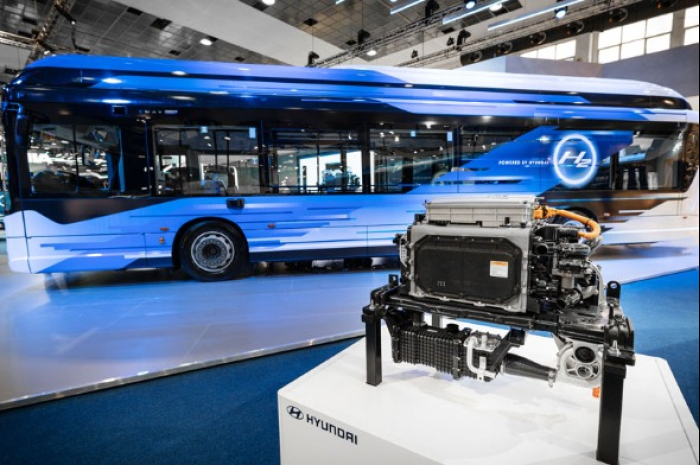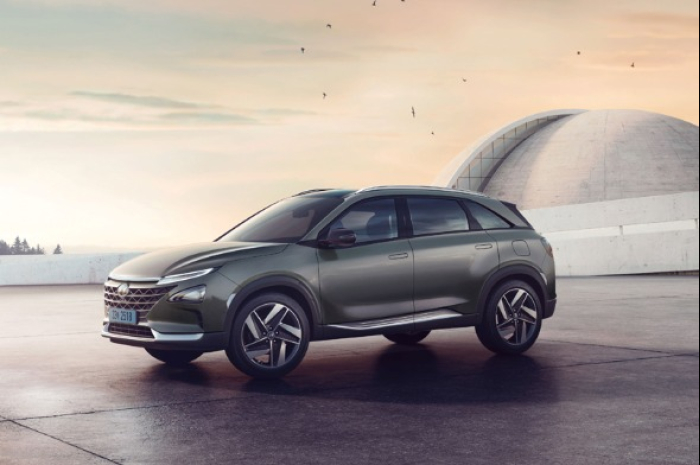Hydrogen economy
Hyundai Motor to take over Hyundai Mobis' fuel cell business
The deal will allow Hyundai Motor to control all stages of the hydrogen vehicle and energy production process
By Feb 16, 2024 (Gmt+09:00)
3
Min read
Most Read
LG Chem to sell water filter business to Glenwood PE for $692 million


Kyobo Life poised to buy Japan’s SBI Group-owned savings bank


KT&G eyes overseas M&A after rejecting activist fund's offer


StockX in merger talks with Naver’s online reseller Kream


Mirae Asset to be named Korea Post’s core real estate fund operator



Hyundai Motor Co. will take over its auto parts and components-producing sibling Hyundai Mobis Co.'s fuel cell business, accelerating the South Korean auto giant’s plan to foster hydrogen energy as its next growth driver.
Hyundai Mobis, also known simply as Mobis in overseas markets, announced in a regulatory filing on Friday that it has agreed with Hyundai Motor to hand over its domestic hydrogen business in a deal worth 217.8 billion won ($164 million).
Under the agreement, Korea’s No. 1 carmaker will take over the auto parts-making affiliate’s fuel cell factory in Chungju, southeast of Seoul, from which fuel cell parts and systems are produced. Hyundai Motor will also take over all the equipment and machinery, as well as the fuel cell research & development facility and staff.
Hyundai Mobis currently produces fuel cell stacks, which play the role of the heart of a fuel cell power system to generate electricity, and fuel cell systems, while Hyundai Motor manufactures hydrogen fuel cell vehicles with fuel cell systems produced by Hyundai Mobis.
The automaking sibling also produces clean hydrogen energy and builds hydrogen fueling stations.
The sister companies' deal will allow Hyundai Motor to control the entire stages of the hydrogen energy and vehicle production process, centralizing its parent Hyundai Motor Group’s hydrogen research & development capabilities under one roof, said an official of the group.
“Global fuel cell car sales have recently tapered off but we expect that hydrogen cars will eventually catch on in the future,” the official added.

According to global rechargeable battery industry tracker SNE Research, global fuel cell vehicle sales in 2023 decreased 30% from a year ago to 14,451 units. The world’s No. 1 hydrogen car seller Hyundai Motor sold 4,709 units, more than halved over the same period.
HYDROGEN, THE FUEL OF THE FUTURE
Despite the recent slowdown, the Korean auto giant stands firm in its bet on hydrogen energy as its next growth engine.
During his visit to CES 2024 last month, Hyundai Motor Group Chairman Chung Euisun reiterated the importance of green energy, saying that it is a must to create a hydrogen vehicle ecosystem for future generations.
Hyundai Motor also unveiled at the world’s biggest tech show a plan to develop not only fuel cells but also other hydrogen technologies covering the entire hydrogen value chain under its fuel cell brand HTWO.
To bolster its hydrogen car sales, Hyundai Motor plans to launch a new hydrogen fuel cell car model that will replace its flagship fuel cell vehicle NEXO next year.
Last year, Hyundai Motor retained its leadership in the hydrogen fuel cell electric vehicle (FCEV) market but saw its market share eroded by its archrival Japan’s Toyota Motor Corp.
The Korean auto giant jumped into the development of hydrogen cars in 1988.
After transferring its fuel cell business to Hyundai Motor, Hyundai Mobis will focus on the development and production of electrification parts and components in preparation for the EV and software-defined vehicle era, the company said.
Following the deal with the car-making affiliate, the automotive parts maker has also decided to call off a fuel cell manufacturing facility investment plan announced in August 2021, according to the filing.
Write to Jae-Fu Kim at hu@hankyung.com
Sookyung Seo edited this article.
More to Read
-
 Korean innovators at CES 2024Hyundai Motor’s themes at CES 2024: Hydrogen, software
Korean innovators at CES 2024Hyundai Motor’s themes at CES 2024: Hydrogen, softwareDec 21, 2023 (Gmt+09:00)
1 Min read -
 AutomobilesHyundai Mobis builds new electrification research center
AutomobilesHyundai Mobis builds new electrification research centerDec 05, 2023 (Gmt+09:00)
2 Min read -
 Hydrogen economyHyundai, Iveco solidify partnership with E-WAY H2 hydrogen fuel cell bus
Hydrogen economyHyundai, Iveco solidify partnership with E-WAY H2 hydrogen fuel cell busOct 09, 2023 (Gmt+09:00)
1 Min read -
 Electric vehiclesHyundai NEXO retains fuel cell EV leadership; Toyota Mirai follows fast
Electric vehiclesHyundai NEXO retains fuel cell EV leadership; Toyota Mirai follows fastSep 11, 2023 (Gmt+09:00)
2 Min read
Comment 0
LOG IN


